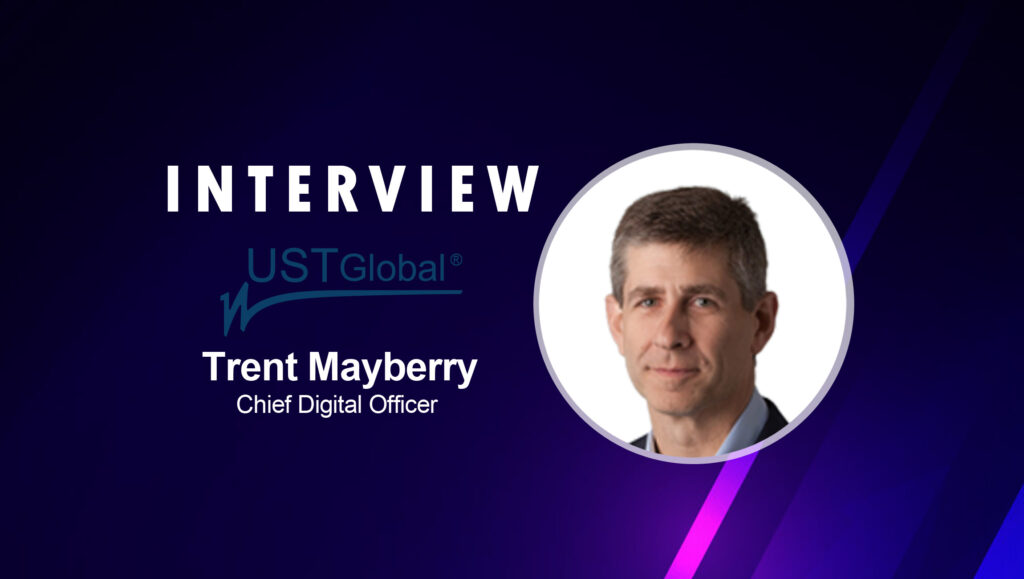Going forward, B2B sales operations, will look fundamentally different from what they were before the Covid-19 pandemic, while the role of sales and marketing will also transform given changing buyer trends and effects of the pandemic on the economy. Catch this SalesTech interview where Trent Mayberry, Chief Digital Officer at UST Global talks about this new normal in B2B sales: ______ Throughout my career, technology sales have been about helping clients to harness new developments and apply those to business opportunities. Over time, the breadth of innovative technologies, and the rapid evolution of digital has left many clients needing to upgrade skills and seek outside help more frequently. While the volume of technology choices is great, digital has also led industry convergence. So, the technology salesperson has had to upgrade his/her skills to include business acumen, to help clients invest wisely. In the past, she/he would typically do prime research to determine state of the market solutions from their own company, and then customize those for each client in the same industry. Today, buyers will expect personalization. Companies that mimic what others are doing will be on an endless spend cycle to keep up. We believe digital sales needs to more creatively innovate and co-develop with clients to help them capture significant value and change the competitive landscape. Because buyers are more sophisticated than ever, digital sales leads need to know more about a company’s needs and offer tailored solutions which deliver more value at greater speed. These solutions must consider the human element – culture, rewards, assistance, change fatigue, etc. In effect, digital sales now also need to incorporate both human and technology into a harmonious solution. Sales success requires intelligence and recommendations based on data presented in real time, not on what other buyers in the past wanted or needed. Clients want you to know what they want, when they want it, and to augment their human talents with AI – and even virtual reality. They want it to be secure by design, and available anytime, anywhere, and have intelligence and automation baked into it. Detailed Information on your target clients, and peer level and best-in-class comparisons. This includes: Read More: Optimizing Your Lead Generation Process Every company collects data about their customers and their products. Some organizations gather external data effectively, gathering real time updates from sales targets – new products, news on operations, or competitive pressures. However, many companies fail to share that data effectively between departments. When that happens, marketing efforts go to waste, and sales teams feel frustrated by their inability to use the insights they receive. Sales and marketing teams must learn to communicate better to make the most of the internal and external data they collect. Even the smallest operation needs a CRM. Rather than keep track of leads and opportunities in spreadsheets, businesses of all sizes should use CRM solutions to improve their sales processes. Note, simplify CRM and ensure that it directly aligns with the sales process, or sales personnel will spend more time in administration, and less time with target clients. As sales tools become more sophisticated and effective, the trends begin to point in one direction: facilitating target connection. People crave real engagement on topics that matter to them. Whether prospects start the conversation with a chatbot or through a blog post, the most successful sellers in today and beyond will be the ones who provide relevant, consistent communications at the point of need. They will engage prospects and co-develop solutions that are relevant and responsive to changes in the competitive landscape. As a sales leader, clarity and consistency are essential. Remote work makes this even more important. The parameters, prospect information, and details of each task must be clear enough that everybody knows what needs to happen. When your sales team has clear expectations and accountability, they are more likely to deliver. And agreeing on specific goals gives you a framework for assessing their performance. Communication is vital and fundamental to managing your remote team. Without clear paths of communication, you run the risk of projects falling through the cracks and significantly decreasing productivity. The first step is creating dedicated channels of communication. To make it easier for their remote employees to have a flexible and stress-free environment, businesses are incorporating tools to help replace the office touch with technology. Sales leaders need to equip remote sales teams with the tools necessary to help them be successful. Having a CRM, for example is critical for sales teams to follow up with leads and for leaders to track their progress. A CRM allows remote teams to update it with prospects, leads, and existing clients as often as needed. Providing remote collaboration platforms, such as Zoom, is becoming an important substitute for face to face meetings. Its ability to transcribe meetings and support high performance video conferencing has contributed to its success. Read More: Top Global Tech Unicorn Start-Ups For sales leaders contemplating how to react, taking care of their people and customers must be a top priority. Even as they manage that reality, sales leaders also need to adjust how their organizations sell in the face of new customer habits and trying economic times. In many ways, the changes in customer behavior are an acceleration of digital trends that were in motion before the pandemic hit. We are at a digital inflection point, where B2B sales operations going forward will look fundamentally different from what they were before the pandemic. (Source: The B2B digital inflection point: How sales have changed during COVID-19) Spend. While companies are generally reducing spend, a sizable number are increasing or maintaining it, with rates depending on company size, sector, and—more than any other factor—location in the world. Digital. Looking forward, B2B companies see digital interactions as two to three times more important to their customers than traditional sales interactions. Remote. Almost 90 percent of sales have moved to a video conferencing (VC)/phone/web sales model, and while some skepticism remains, more than half believe this is equally or more effective than sales models used before COVID-19. The salesperson’s role will shift from being product / capability enabled to becoming business advisors. This means they will need to better monitor industry signals and trends and apply those to prospects and business much more effectively. They will consume AI driven insights, and then apply human-centric insights to create a personalized, tailored solution for target clients. This shift from sales to advisor will require new capabilities in helping targets digest relevant information and action it at speed – selling less products/services and more outcomes in the future. They will also need to help create testimonials that enable past clients to effectively market for the salesperson – think viral marketing Catch the latest episodes of the SalesStar podcast today! Viral Nation – Mathew Micheli or Joe Gagliese Establishing trust is better than any sales technique – Mike Puglia Yes, we have done multiple virtual events considering the current situation. Some of them were around the “Meet the Boss” webinars, focused on Digital Transformation. So far, we’ve had 4 sessions in the months of April and May 2020. I also attend vendor conferences periodically. UST Global is a technology partner dedicated to transforming businesses, communities, and the people who live within them. Operating in 25 countries, we deliver future-ready digital transformation strategy services, products, and platforms that create new possibilities and help you imagine what’s next in financial services, healthcare, retail, manufacturing, semiconductor, and communications. But what matters most is the deep partnership we forge with clients to solve the unique challenges you face today, while preparing you for tomorrow. Our Global presence: 25 Countries , 42 Operating Centers and 34 Delivery Centers – USA, Spain, UK, Germany, Poland, Portugal, Switzerland, France, Israel, India, China, Hong Kong, Japan, Singapore, Philippines, Malaysia, Taiwan, Australia, Puerto Rico, Costa Rica, Mexico, Argentina. Trent Mayberry is UST Global’s Chief Digital Officer responsible for creating disruptive digital transformation for the company and its customers. Trent leads the Digital Services Group aiming at capturing business values through digital innovation in the financial services, healthcare, and retail industries. Trent held several senior leadership positions in strategy, client delivery, and technical development. Before joining UST Global as CDO in February of 2019, Trent spent 29 years at Accenture as Managing Director, Digital in North America and Asia Pacific. In his role, Trent led digital transformation teams specializing in digital architectures and large-scale implementations of cloud and analytics solutions. He began his career as a Software Developer for IBM in the defense division. Trent is an industry thought leader, author, and expert on digital transformation, and often shares insights through conferences, board-level discussions, and publications. He leverages his experience in rapid innovation and data-driven experimentation with fortune 500 companies, to help scale delivery programs, and deliver high-impact customer engagement and product differentiation strategies. Aside from his professional responsibilities, Trent was a digital mentor for Female Founders, an independent non-profit organization committed to promoting gender equality. He holds a Bachelor of Science degree in computer science from the University of Illinois. He is currently based in Chicago.Hi Trent, welcome to this SalesTechStar interview!
In your time through the years, how have you seen the role of the tech / digital salesperson evolve? How do you feel that the impact of salestech has inspired this change in the way sales teams now approach their role?What are some of the top in-demand features when it comes to data and insights that you feel every tech salesperson and marketing team / digital lead should have easy access to?
What according to you are some of the must-have sales technologies that everyone in technology sales including field sales teams should integrate into their overall tech stack?
As a tech sales leader / digital expert, in a challenging environment due to the Covid19 pandemic: what are some of the ways in which you are enabling a balanced remote work culture to keep customer conversations ongoing while maintaining motivation levels among the team?!
Enterprise sales / Tech sales for a certain cadre has its own set of must-haves and demands: what are some of the top strategies or fundamentals you’d advise teams use when they are facing challenges when selling in a time such as this? Some tips on sales technologies that can especially help here.
How according to you will the typical role of tomorrow’s B2B/Tech sales person evolve, given the dynamics and innovations in SalesTech?
Tag (mention/write about) the one person in the industry whose answers to these questions you would love to read!
Your favorite Sales/SalesTech quote and sales leadership books you’d suggest everyone in tech Sales reads
Tell us about some of the top sales/salestech/fintech/ other events that you’ll be participating in (virtually, given the current global pandemic) (as a speaker or guest!) in 2020!

Also Catch, these latest episodes of the SalesStar Podcast!





















